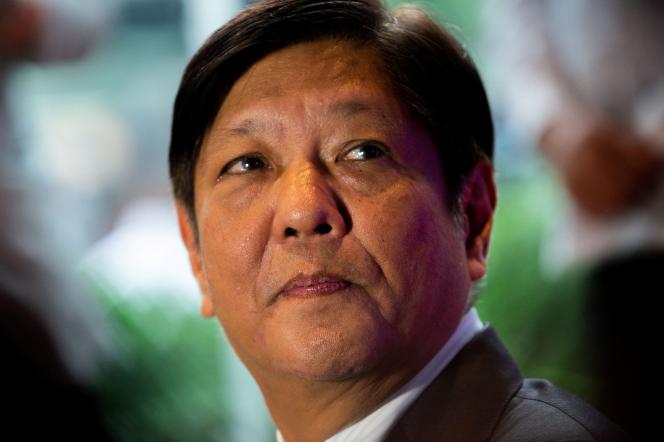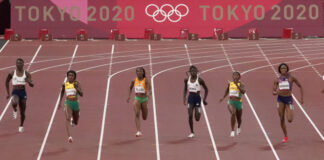Announced as “simple and solemn”, the inauguration on Thursday, June 30, of the new president, Ferdinand Marcos Jr, 64, known as “Bongbong”, in front of the imposing National Museum of Fine Arts, in the heart of Manila, is highly symbolic: behind his appearance as a spoiled ex-child, and the image of a dilettante that has stuck with him for a long time, “Bongbong” Marcos fulfills the dream long professed by the Marcos family of a return to power, thirty-six years after the collapse of the dictatorship in February 1986.
Opponents of the Marcos clan gathered near the place of the ceremony. In front of hundreds of local and foreign dignitaries, including Chinese Vice President Wang Qishan, “Bongbong” delivered an apology for his father, the former dictator who ruled the archipelago for nearly three decades: “I once knew a man who saw how little had been accomplished since independence. He made them happen,” said Marcos Jr, saying his father built more roads and produced more rice than all of his predecessors combined. “So will his son. I will make no excuses,” he promised, anxious to be part of a continuity of the past.
This return is the culmination of a three-decade crusade, which resulted in “Bongbong” Marcos, like his sister “Imee”, being elected to key positions – those of provincial governor, deputy, then as a senator, while Imelda, the mother, was twice elected deputy. It was all a triumph: “Bongbong” was elected with 58.7% of the vote, a record for a Philippine president under the current Constitution. Mr. Marcos also has, through the alliances forged by Uniteam, the winning ticket formed with Sara Duterte, the daughter of the outgoing president and victorious candidate for the vice-presidency (both are elected separately by universal suffrage), a majority in the House of Representatives and the Senate – and the benevolence, if not the complicity, of the very malleable institutions of Philippine democracy. The Supreme Court of the country thus rejected, Tuesday, June 28, unanimously, the last two requests for disqualification brought by plaintiffs from civil society, due to unpaid taxes from the time of the dictatorship of his father. .
Outside the museum’s colonnaded building, which housed the Philippine Parliament until Marcos Sr. suspended it by declaring martial law in 1972, “Bongbong” delivered his first speech as president before a crowd of supporters dressed in red, the color of his campaign. Placed under high security, with more than fifteen thousand police officers, soldiers and coastguards deployed throughout the capital, the former Parliament was also the site of the first major student demonstrations, in January 1970, following the re-election of Marcos senior, a few months earlier, despite the financial rout of the country.
Marcos Jr. is, in more ways than one, expected at the turn: in terms of economic governance – he kept the portfolio of the Ministry of Agriculture, the only sector he said he wanted to reform, during his campaign – and politics , but also positioning in the geopolitical chess game being played between China and the United States in the region.
Good disposition from Washington
While Beijing sent Mr. Qishan to the ceremonies on Thursday, Washington sent Douglas Emhoff, the husband of US Vice President Kamala Harris, there – a sign, commentators say, of Washington’s goodwill towards of the new president, after the turbulence experienced by bilateral relations under Duterte. “In order to best preserve interests with their former colony, the United States has no choice but to come to terms with the Marcos family,” writes Sophie Boisseau du Rocher in a recent memo from the French Institute of international relations, recalling US goals to “more actively reinvest the region (…) to counter China’s growing influence and ambitions”.
After distancing himself from the American ally, at the start of his mandate, and making overtures to China, Rodrigo Duterte finally renewed, in 2021, the bilateral security pact (visiting forces agreement), which allows the navy access to Philippine bases. And the last act of its foreign minister, Teodoro Locsin, was to end, on June 23, the talks started in 2018 with Beijing on joint explorations of gas and oil reserves in the exclusive economic zone of the Philippines, by evoking Chinese demands incompatible with the Philippine Constitution.
In progressive and activist circles, there are questions about what forms the “Marcos Restoration” will take – in the words of historian Manolo Quezon – and whether or not it will prolong the democratic regression seen under his predecessor. Reacting on Twitter to the increased vigilance of the security services in the face of alleged plans by opponents to disrupt the June 30 ceremony, Mr. Quezon sees it as a “likely characteristic of the next government”: “The extreme concern vis-à-vis conspiracies, real or imagined. »
Mr. Duterte, who has waged a dirty war on drugs by inciting the police to “kill” drug dealers – NGOs report tens of thousands of extrajudicial executions – has used all the means at his disposal to silence critics .
He harassed the opposition media: the Rappler site, run by the Nobel Peace Prize (2021), Maria Ressa, again received, on June 29, an injunction from the stock market authorities to close, on the pretext of a takeover of foreign participation in the capital of the company, yet already converted into employee shareholding.
Mr. Duterte has also persecuted the main critical voice, former Senator Leila de Lima, imprisoned since 2017, on the gross charge of drug trafficking. However, Ms. de Lima’s main accusers backtracked on their statements just before the election.
Towards continuity in democratic denial
Seen as an ally of Mr. Duterte, will Mr. Marcos keep up the pressure on the opposition and civil society, or embrace softer governance? One thing is certain: he has already declared, during the campaign, to oppose the investigation of the International Criminal Court (ICC) into the war on drugs of his predecessor. However, suspended in November 2021, it has just been reopened by the new ICC Prosecutor General, Karim Khan.
Finally, Mr. Marcos inherited an anti-terrorism law passed by Mr. Duterte and considered excessively liberticidal by civil society, because it favors the use of red-tagging – the abusive designation of NGOs, media or opposition figures, as agents of the communist insurrection.
The appointment as chief security coordinator of Ricardo de Leon, a former police lieutenant colonel who fled with the Marcos family in 1986 and who once worked for Senator “Imee” Marcos, argues in favor of a certain continuity in democratic denial in the Philippines.

















